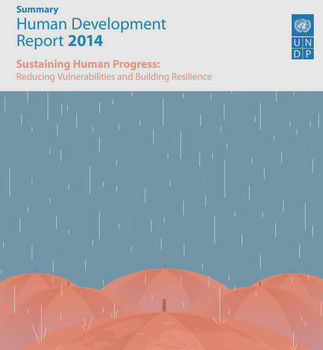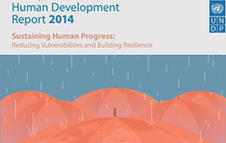
The Report highlights the need for stronger collective action and better global coordination in advocating for development, and makes reference to the effects of crises that are being experienced at the local level.
Persistent vulnerability threatens human development, and unless it is systematically tackled by specific policies and social norms, progress will be neither equitable nor sustainable. This is the central theme of the 2014 Human Development Report, entitled Sustaining Human Progress: Reducing Vulnerabilities and Building Resilience, which provides a fresh perspective on vulnerability and proposes new ways to strengthen resilience.
The publication calls for the universal provision of and access to basic services, as well as stronger policies for social protection and full employment, to advance and secure progress in development. The latest estimates of the UNDP Multidimensional Poverty Index reveal that almost 1.5 billion people in 91 developing countries are living in multidimensional poverty, with overlapping deprivations in health, education and living standards. Although poverty is declining overall, according to the Report, the universal provision of basic social services is essential to enhancing people's resilience.
The issue of basic services has been recognized as a priority by UCLG. International recognition of the importance of sub-national governments in ensuring the universal provision of basic services is growing, as is the role of basic services in poverty alleviation and sustainable development. For these reasons, the Third Report of the Global Observatory on Local Democracy and Decentralization (GOLD III) is dedicated to the issue of basic services.
Collective effort and coordinated action at the global level
The Report also urges stronger collective action, as well as better global coordination and further commitment to supporting resilience, to address vulnerabilities that are becoming increasingly global in both their origin and impact.
Threats ranging from financial crises to climate change to conflicts are trans-national in nature, but their effects are experienced both at local and national levels, and often overlap.
To increase support for national strategies and open up policy space for nations to adapt the principle of universalism to specific country conditions, the 2014 Report calls for “an international consensus on universal social protection” to be included in the Post-2015 Agenda.
The 2014 Human Development Report comes at a critical time, as the attention of the international community is focused on the creation of a new development agenda, following the 2015 deadline for achieving the Millennium Development Goals (MDGs).
According to information provided in the Report, the new development agenda should integrate all processes, at the same time recognizing differentiated responsibilities. It should acknowledge local and regional governments as a specific sphere of government and as key actors of development.
Go to the 2014 Human Development Report











